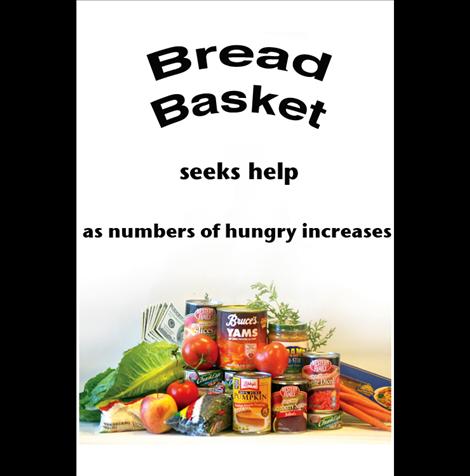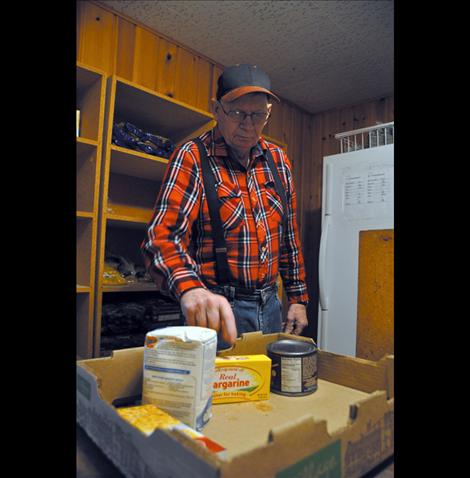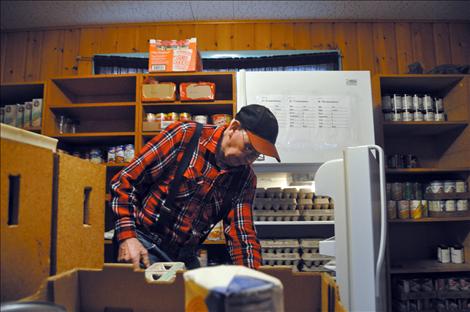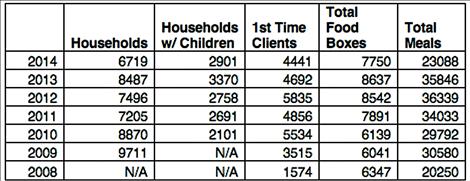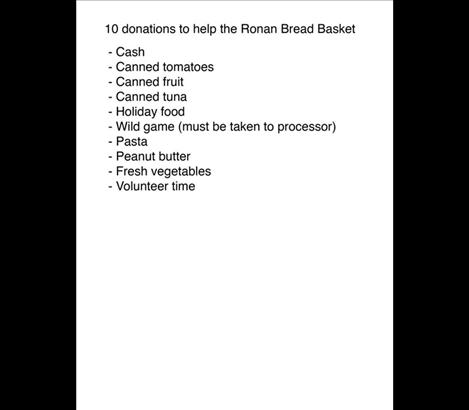Ronan Bread Basket
Hey savvy news reader! Thanks for choosing local.
You are now reading
1 of 3 free articles.
Record numbers of families have sought food assistance from the Ronan Bread Basket in recent months and the nonprofit’s leadership is hoping the community will help meet increased demand.
The number of families seeking assistance from the Bread Basket has swollen to 250 households, almost doubling the 175 families that typically come for emergency food in a month’s time.
Bread Basket Director Sherri McDonald said that numbers are higher than she has seen in her 28 years as director.
“We’ve drastically had to stop giving out certain things,” McDonald said. “We can’t buy it.”
The rising numbers are coupled with increasing food prices for staple items. According to the United States Department of Agriculture, food prices were on track to increase 2.6 to 3.5 percent in 2014 and an additional 2 – 3 percent in 2015.
“Bacon can be anywhere from $7 to $10 for just one slab of bacon,” McDonald said. “Then margarine jumped last week to $4. It is expensive.”
The Bread Basket is run entirely on volunteer labor, donations, and occasionally grants that help foot the bill for delivering three to four days worth of emergency food to families in need. McDonald said local churches, the Confederated Salish and Kootenai Tribes, Polson Walmart, Salish Kootenai College, Lake Seed, Mack Days and grocery stores in Ronan are the biggest supporters of the pantry. The group of volunteers and supporters form a food gathering network that works like a well-oiled machine.
Each Thursday, a driver from Salish Kootenai College goes to Polson to pick up excess bread and meat given to the Polson Loaves and Fishes food bank by local eateries. The Polson organization has been extremely generous in sharing food through the years, McDonald said. It helps Ronan’s smaller organization that doesn’t have as much food industry in town to produce leftovers. The bread is frozen in a freezer and doled out on Tuesdays and Fridays, when the Bread Basket is open.
Then, every six weeks free food arrives from the Montana Food Bank Network. These wares are usually donated from major corporations like Kellogg’s and General Mills to the National Food Bank Network. Regional food banks like the Montana Food Bank can then bid on cargo-truck sized lots of food to disperse throughout their network.
The free food is very important to the Bread Basket, but can’t always be relied upon for staple items, McDonald said.
“You never know what you are going to get,” she said. “It’s wonderful, but it’s not always the same.”
Last week, the latest wares from the Montana Food Bank Network included pallet after pallet of juice. McDonald was thankful for the bounty and said the juice would be a nutritional boost for the recipients, but juice alone won’t fill the stomachs of the 38 families who had visited the day previously.
She eyed the oatmeal shelf warily as one of her volunteers called to ask what needed to be purchased for the next days’ food boxes. The 20 boxes on the shelf would only last half the day if families came in at the same level as they had the previous day. She asked the volunteer to buy more from a local grocery store.
Purchasing food at stores in Ronan has long been something the Bread Basket is proud to do, McDonald said. It might cost a bit less to go to Costco or another box store in Missoula or Kalispell where dollars stretch further, but it is important to keep money in the community, especially since local grocery stores often give their day-old surplus to the Bread Basket, McDonald said.
“They help us,” she said. “We try to help them.”
Buying food takes its toll on the Bread Basket’s shoestring budget, however. Buying only eggs for 250 families easily racks up a $300-$500 bill. To give each family a box of cereal would cost around $1,000.
As the rolls have swollen, the Bread Basket has cut much of what it used to give families. The sugar shelf is barren, as is the dessert freezer.
“These are things people can live without,” McDonald said. “And sugar’s not good for you. You don’t need it.”
Basic items that people usually love to have, like canned tomatoes that can be poured over pasta, are also nowhere to be found in the Bread Basket.
The organization’s board recently decided it wouldn’t be able to purchase food for the holiday baskets it usually doles out in the wintertime. Funds are too low. The Bread Basket has half of the amount of money in its bank account as it did in October of last year. Monetary contributions are what the organization needs right now, McDonald said. If the Bread Basket can raise $5,000 by the end of November, Town Pump will donate $5,000 to the food bank.
There are also other ways to contribute. Canned fruit, cereal, canned tuna, fresh fruit, peanut butter, pasta, canned tomatoes, and holiday foods are items that are needed currently.
Fresh fruits and vegetables from gardens filled the pantry this summer.
“People were extremely generous with their gardens this year,” McDonald said.
As the valley heads into winter, killed game can also be donated to local food processors that will relay the food to the Bread Basket. The organization pays the wrapping fee. The game must be processed professionally in order to be accepted.
People who give their extra time to volunteer are also appreciated.
“If you are interested and you have the time we would love to have you come in and talk to us,” volunteer Kristine Meile said.
Volunteer Marie Hall said both the community and workers benefit from the work done at the Bread Basket.
“In the case of a lot of us, we worked our whole lives, and then we retired and loved the valley and wanted to give back,” Hall said. “This is a great way to give back. This is a great group of people.”
Bob Burrell has been stocking shelves at the pantry for more than 12 years and said he loves it.
“You get to meet a lot of people,” Burrell said. “It’s easy. Once you get on here, you zoom right through this. It serves people who can’t feed themselves, which is a lot more people than it used to be.”
Hunger by the numbers
The sudden increase in demand for food in Ronan is unexplained, McDonald said. Usually needs ebb in the summer months, but this year more and more people kept coming through the doors. The increase in demand in Ronan coincides with what appears to be a slightly diminishing need for emergency food in Lake County overall.
So far this year, more than 6,719 households have sought assistance at Lake County food banks. That’s down from the peak in 2009 when 9,711 households sought assistance and accessed more than 30,580 meals through food programs. There were 11,432 total households counted in Lake County during the 2010 decennial census.
Jeff Gutierrez, agency relations manager for the Montana Food Bank Network, said it is difficult to grasp the exact role hunger plays in Lake County.
“It is very difficult to paint an accurate picture of hunger,” Gutierrez said. “While the need for supplemental or emergency food assistance tends to be there, the challenge is getting a realistic number and, most importantly, reaching those food secure individuals.”
Results released in 2013 of a community survey conducted by the Montana Food Bank Network show that many Lake County people may be going hungry without seeking assistance.
The survey found that Lake County has the state’s fifth highest rate of food insecurity with 18 percent of adults and 30 percent of children not receiving enough nutrition. Yet some people are not utilizing programs that could help meet hunger needs.
Lake County has a 68 percent participation rate of those eligible for SNAP, the federal food stamp program, and 44 percent participation rate for those eligible for WIC, the federal food program for impoverished mothers and children.
Gutierrez said not accepting help isn’t only a Lake County thing, it is a problem in Montana overall.
“I think a lot of Montanans are just too proud to ask for help,” he said.
The survey found several factors working against food accessibility in Lake County, including ruralness that limited access to affordable grocery stores and rent that, on average, costs more than the recommended 30 percent of household income. Several respondents said they paid their rent instead of purchasing food.
A high unemployment rate also contributed to hunger issues, with Lake County ranking in the top five in the state for rate of unemployed. That number has ebbed some since the survey was released, with the county’s 5.4 percent September unemployment rate is the lowest seen since November 2007.
Other unique factors helped limit household expenses, like access to tribal health facilities.
Sorting through the data is interesting, but Gutierrez said asking local food pantries what they need for help is the best way to get a pulse on how to fight hunger in the community.
To contact the Ronan Bread Basket call (406) 676-4357. The organization is located at 10 6th Ave SW, Ronan, Mt 59864.
Items needed:
Cash, Canned Tomatoes, Canned Fruit, Fresh Fruit, Canned Tuna, Cereal, Oatmeal, Fresh Vegetables, Peanut Butter, Holiday Food, Volunteer Time















